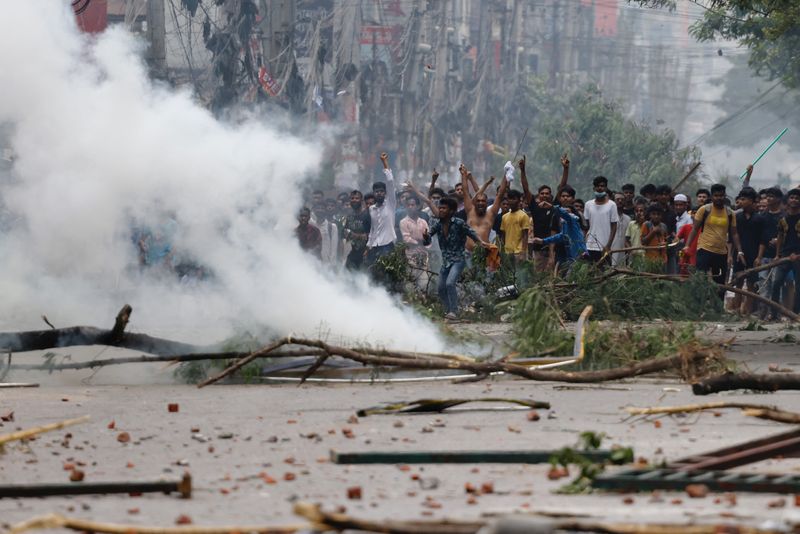By Mohammad Ponir Hossain and Sam Jahan
DHAKA (Reuters) -Three individuals had been killed in Bangladesh on Friday as police cracked down on unrelenting student-led protests towards authorities job quotas regardless of a ban on public gatherings, native media stated.
Police fired tear gasoline to scatter protesters in some areas, Reuters journalists stated. One stated he may see many fires throughout the capital Dhaka from a rooftop and smoke rising into the sky in a number of locations.
Telecommunications had been additionally disrupted and tv information channels went off the air. Authorities had reduce some cellular phone companies the day gone by to attempt to quell the unrest.
Bengali newspaper Prothom Alo reported practice companies had been suspended nationwide as protesters blocked roads and threw bricks at safety officers.
Three individuals had been killed on Friday, it stated, after violence on Thursday in 47 of Bangladesh’s 64 districts killed 27 and injured 1,500.
The entire variety of useless from the protests touched 105 on Friday night time, AFP reported citing hospitals. Reuters couldn’t instantly confirm the reviews and police haven’t issued a casualty toll.
The U.S. Embassy in Dhaka stated that reviews indicated greater than 40 deaths and “hundreds to possibly thousands” injured throughout Bangladesh.
In a safety alert, it stated protests had been spreading, with violent clashes being reported throughout Dhaka. The scenario was “extremely volatile”, it stated.
The protests initially broke out over pupil anger towards controversial quotas which put aside 30% of presidency jobs for the households of those that fought for independence from Pakistan.
The nationwide unrest – the largest since Prime Minister Sheikh Hasina was re-elected this yr – has additionally been fuelled by excessive unemployment amongst younger individuals, who make up almost a fifth of a inhabitants of 170 million.
Some analysts say the violence is now additionally being pushed by wider financial woes, comparable to excessive inflation and shrinking reserves of overseas trade.
The protests have opened outdated and delicate political faultlines between those that fought for Bangladesh’s independence from Pakistan in 1971 and people accused of collaborating with Islamabad.
The previous embody the Awami League get together of Hasina, who branded the protesters “razakar” – making use of a time period that described independence-era collaborators.
Worldwide rights teams criticised the suspension of companies and the motion of safety forces. The European Union stated it’s deeply involved by the violence and lack of life.
“It is vital that further violence is averted and that a peaceful resolution to the situation is found as swiftly as possible, underpinned by the rule of law and democratic freedoms,” it stated in an announcement.
Neighbour India stated the unrest was an inner matter of Bangladesh and that every one 15,000 Indians in that nation had been protected. Indians finding out in Bangladesh had been returning by street.
Violence linked to the protests additionally broke out in distant London, which is dwelling to a big Bangladeshi inhabitants, and police needed to quell clashes between giant teams of males within the east of the British capital.
TELECOMS DISRUPTED, WEBSITES HACKED
Friday started with the web and abroad phone calls being crippled, whereas the web sites of a number of Bangladesh newspapers didn’t replace and had been additionally inactive on social media.
Just a few voice calls went by, however there was no cellular knowledge or broadband, a Reuters journalist stated. Even textual content messages weren’t being transmitted.
Information tv channels and state broadcaster BTV went off the air, though leisure channels had been regular, he stated.
Some information channels displayed a message blaming technical issues, and promising to renew programming quickly.
The official web sites of the central financial institution, the prime minister’s workplace and police appeared to have been hacked by a bunch calling itself “THE R3SISTANC3”.
“Operation HuntDown, Stop Killing Students,” learn similar messages splashed on the websites, including in crimson letters: “It’s not a protest anymore, it’s a war now.”
One other message on the web page learn, “The government has shut down the internet to silence us and hide their actions.”
The federal government had no touch upon the communications points.

On Thursday, it had stated it was prepared to carry talks with the protesters however they refused.
Many opposition get together leaders, activists, and pupil protesters had been arrested, stated Tarique Rahman, the exiled performing chairman of the primary opposition Bangladesh Nationalist Occasion (BNP). Reuters couldn’t verify the arrests.




